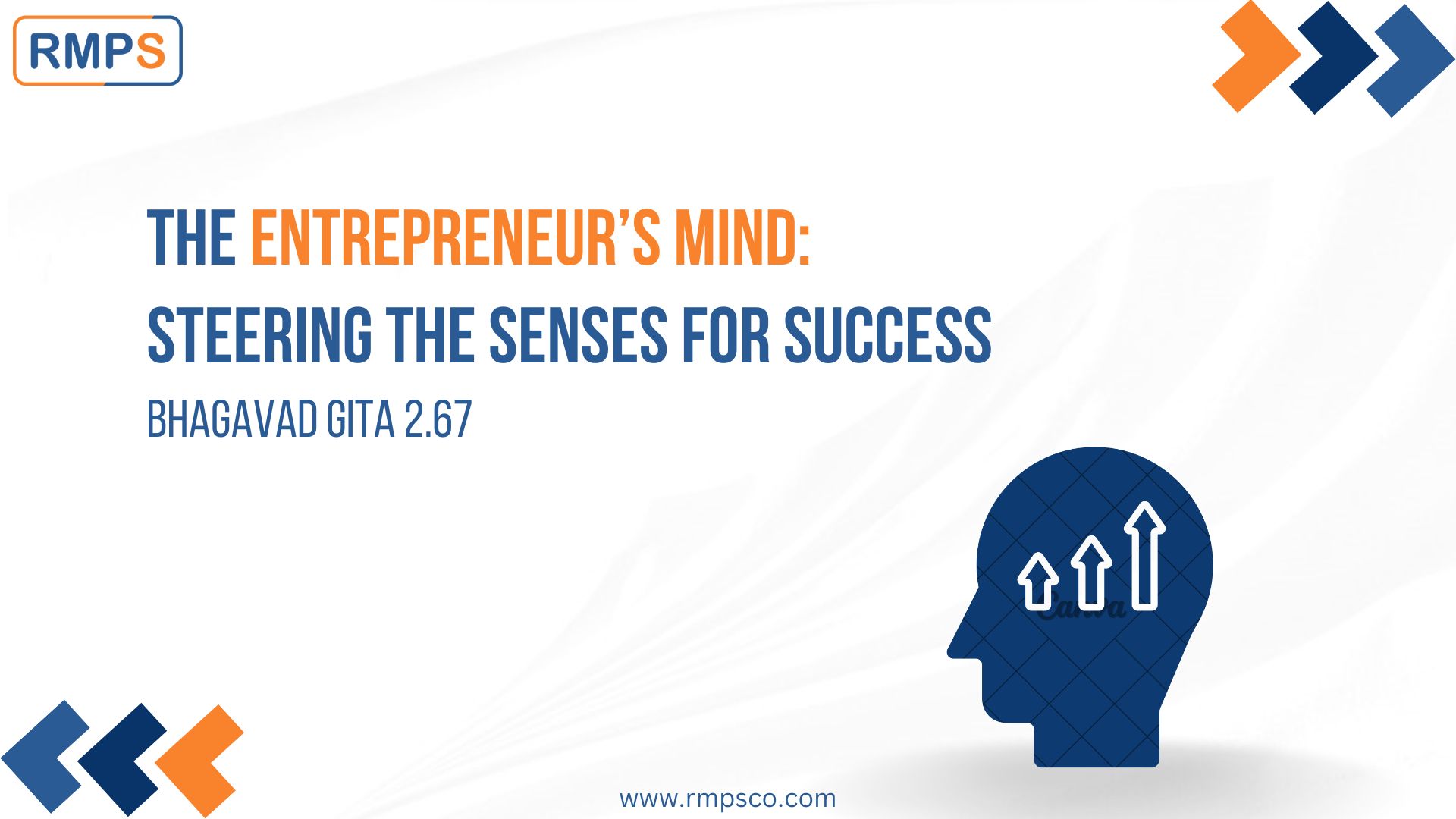
Bhagavad Gita: Chapter 2.67
Sanskrit Verse:
इन्द्रियाणां हि चरतां यन्मनोऽनुविधीयते |
तदस्य हरति प्रज्ञां वायुर्नावमिवाम्भसि ||
Translation: “As a boat on the water is swept away by a strong wind, even one of the wandering senses on which the mind focuses can carry away a person’s intelligence.”
The Entrepreneurial Lens: The Power of a Focused Mind
In the ever-evolving world of business, an entrepreneur’s Mind ability to maintain focus determines success or failure. This verse highlights a universal truth: a scattered mind is like a rudderless boat, vulnerable to external forces. Just as a storm can drag a ship off course, unchecked desires and distractions can derail an entrepreneur from their goals.
This insight is crucial for business leaders, founders, and visionaries. The marketplace is filled with distractions—short-term profits, market trends, competitor strategies, and fleeting opportunities. If an entrepreneur’s mind gets carried away by these, they risk losing sight of their long-term vision.
Practical Insights for Entrepreneur’s Mindset
- Master Your Senses, Master Your Business:
Entrepreneurs often chase every new trend, but not every opportunity aligns with their core vision. Learn to differentiate between productive opportunities and mere distractions.
Example: A tech startup should not pivot at every new innovation in the industry but must refine its unique value proposition.
- Avoid Decision Fatigue:
Constant exposure to choices weakens decision-making. Reduce unnecessary choices by automating minor decisions (e.g., meal plans, meeting schedules) so you can focus on strategic calls.
Example: Steve Jobs wore the same black turtleneck daily to eliminate trivial choices and reserve energy for innovation.
- Discipline Mind to Stay on Course:
Train yourself to focus on long-term goals rather than instant gratification. The lure of quick success (viral marketing, short-term profits) often deviates entrepreneurs from sustainable growth.
Example: Amazon’s success was built on long-term customer obsession rather than immediate profitability.
- Develop a Resilient Mindset:
Entrepreneur’s Mind will face setbacks. When the mind is firm, external challenges—negative feedback, funding issues, market crashes—will not shake their determination.
Example: Elon Musk faced near bankruptcy multiple times but remained steadfast in his vision for Tesla and SpaceX.
- Digital Detox and Mental Clarity:
Constant social media and information overload overstimulate the mind, leading to anxiety and loss of direction. Schedule periods of deep work free from digital interruptions.
Example: Many CEOs practice “Think Weeks,” where they disconnect from routine tasks to strategize future growth.
The Balance Between Awareness and Action
The Bhagavad Gita does not preach escapism but rather teaches balance—being aware of external influences while not letting them dictate actions. For an entrepreneur, this means staying informed about industry changes but not becoming reactive to every shift.
Just as a skilled sailor navigates through storms by staying aware but not being overwhelmed, entrepreneurs must master their senses, control distractions, and align their actions with their ultimate vision.
Stay Steady, Stay Successful
Success in entrepreneurship is not just about external skills—funding, networking, and strategies. It is equally about internal mastery—focus, discipline, and resilience.
By applying the wisdom of Bhagavad Gita 2.67, entrepreneurs can train their minds to remain undistracted, ensuring that their journey is not dictated by fleeting desires but by a well-defined purpose.
Let the mind be the captain, the senses the crew, and the business the ship—steer wisely and reach great destinations.
LinkedIn Link : RMPS Profile
This article is only a knowledge-sharing initiative and is based on the Relevant Provisions as applicable and as per the information existing at the time of the preparation. In no event, RMPS & Co. or the Author or any other persons be liable for any direct and indirect result from this Article or any inadvertent omission of the provisions, update, etc if any.
Published on: April 4, 2025

This is such a well-balanced and thoughtful post.
Thank you for your kind words.